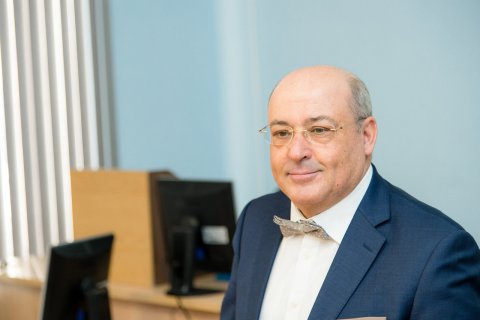On February 13, the Vice President of the Technical Services Division of the SMS Group Holding Company Pino Tese visited South Ural State University with a lecture on “Lifecycle Managing”. SMS Group is the leading international manufacturer of metallurgical equipment.
.jpg) The audience included representatives of SUSU who are participating in the program “Managing a Corporation’s Movement to the Life Cycle Business Model”, part of the Management School project of the Moscow Aviation Institute. The key principle of the Management School, taken from Goldratt’s book Critical Chain, is the think tank model, which makes it possible to utilize a corporation’s internal resources to solve issues related to changes. The goal of the program is to support corporations’ movement to the life cycle model and the systemic organization of business processes using modern international management techniques, which is especially important for forming the University 3.0 model.
The audience included representatives of SUSU who are participating in the program “Managing a Corporation’s Movement to the Life Cycle Business Model”, part of the Management School project of the Moscow Aviation Institute. The key principle of the Management School, taken from Goldratt’s book Critical Chain, is the think tank model, which makes it possible to utilize a corporation’s internal resources to solve issues related to changes. The goal of the program is to support corporations’ movement to the life cycle model and the systemic organization of business processes using modern international management techniques, which is especially important for forming the University 3.0 model.


In his lecture, Pino Tese spoke about how to manage life cycles and improve them, and offered a few practical examples of each cycle type from SMS Groups’ history.
The company has been working with SUSU for more than five years: students of the university complete internships in this division’s locations in Russia and Germany. Mr. Tese spoke about the goals and advantages of this practice.
– What are the goals of our students’ practical training at SMS Group?
– In the beginning of the lecture I noted that we in the company are putting large investments in to assets here in the Ural Region. We have installed equipment, we’re thinking about new jobs, and in terms of life cycle, we’re thinking about the workforce and the specialists who can prolong the life cycle of our assets. In our service division, we always need young blood. The idea is to take young, intelligent students and use their potential to expand our business in Russia. We give students the chance to study, give them instruments, and offer the chance to work in our company long-term.
– What qualities must students have to complete an internship at your company?
– There are three elements. Good indicators of academic success, good knowledge of English, and motivation to participate in this difficult work. If you are smart, but don’t gravitate to taking risks, you shouldn’t participate in this program.
– What level are our students at? Can they work in your company?
– Not all of them can work for us, but with the changes that the university is undergoing under the Rector’s guidance, of course, this will be available to a larger and larger number of students and university graduates. Digitization projects can help with this, and also provide opportunities to study English better.
Maksim Anufriev, Master’s student of the Polytechnic Institute in the Department of Processes and Machines of Plastic Metal Working (academic advisor Marina Samodurova), who was chosen through a contest for the Institute’s students, completed a three-month internship at SMS Group in Germany and shared his thoughts with us.
.jpg)
“It was great. This is a wonderful chance for students to see their path towards their profession. SMS Group makes it possible to improve one’s language skills and see how a big company works from the inside. I gained a huge amount of experience and understanding of how modern industry is built. I wrote programs for simulations of hydraulic equipment. I’m sure that my history with SMS Group is not over, which means I will keep working with their equipment. I learned how this equipment worked during my internship – it was an indispensable experience,” says Maksim.
At the end of his internship, Pino Tese awarded Maksim with a certificate proving that he completed an internship in their company.
Maksim is one of the students who completed training and defended his Master’s Degree under the Master 2 program at the National Engineering School of Saint Etienne (ENISE) in France.
“The possibility of participating in international programs organized and supported in our Department related to student mobility open up new paths for future determination and understanding of one’s activities after graduation,” says Maksim.
The Department’s partnership with leading international corporations and universities speaks highly of its academic and research work. As a result of this partnership, the international Mechanics, Laser Processes, and Digital Manufacturing Technologies Laboratory was founded. The initiator of this laboratory’s creation was the Lavrentyev Institute of Hydrodynamics of SB RAS and ENISE, working with SUSU and SMS Group.




